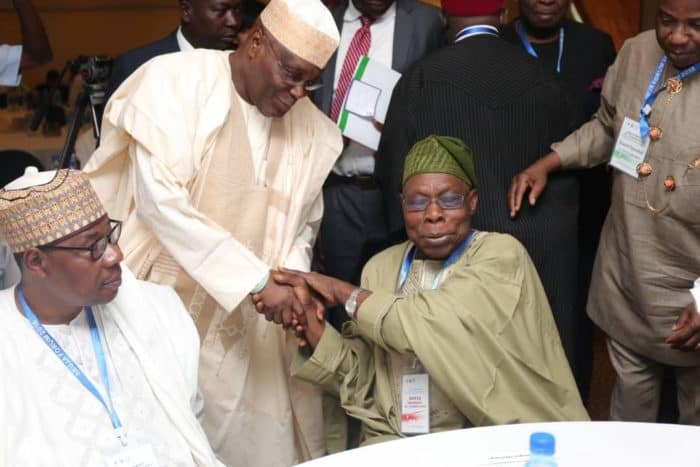
Buhari Is Still Trying To Correct The Problems Obasanjo, Atiku Brought On Nigeria – APC
by Oladipo AbiolaThe ruling All Progressives Congress (APC) has again accused the major opposition Peoples Democratic Party (PDP) of wasting Nigeria’s resources when they were in power.
The APC further stated that former President, Chief Olusegun Obasanjo, and his Vice, Alhaji Atiku Abubakar who ruled Nigeria for eight years did almost nothing to set the country on the path of growth and development but rather looted the nation’s resources in connivance with their political friends.
The APC stated this position in a statement on Sunday by Yekini Nabena, the party’s Deputy National Publicity Secretary where it called on Obasanjo to account for the $16billion his administration allegedly spent on the power sector without any result to show.
It also accused Atiku of privatizing many of the Nation’s assets by selling them off to his friends at ridiculously cheap prices.
The APC thereafter noted in its statement that the two former leaders have no moral right to write letters to the present administration under President Muhammadu Buhari on how to run the affairs of Nigeria.
Below is the full statement:
It is baffling that the same political actors that midwifed and institutionalized the national rot, corruption, impunity, and eroding of our value systems are the same characters posing as voices on the way forward in our national life. How ironic!
Former President Olusegun Obasanjo could start with telling us where the electricity is despite $16billion he spent on the power sector.
Obasanjo’s deputy, Alh. Atiku Abubakar should account for the privatization exercise under his watch which saw national assets sold off to friends and cronies with no benefit to the country.
Successive Peoples Democratic Party (PDP) administrations can also start by accounting for the trillions stolen from our national coffers in the guise of a fraudulent fuel subsidy regime.
While it is well within the rights of these political actors to write skewed letters, spew empty, hypocritical, tongue-in-cheek, and two-faced economic magic models in line with their Dubai meeting strategies, this administration is walking the talk with verifiable projects and people-centred interventions that is uplifting Nigerians.
These political actors probably only listen to their own voices because Nigerians have long stopped taking them seriously as they simply lack the antecedents and moral credentials to guide Nigeria and Nigerians to the path of prosperity and progress.
Instead of the “do or die” lingo they introduced to our electioneering, votes are beginning to count as our elections improve steadily.
Their abandoned projects which constituted drainpipes on national resources are being completed by this administration. The brazen culture of impunity and corruption which they institutionalized is being replaced by strong and accountable systems.
The culture of roundtripping and the rested subsidy regime in the petroleum sector has been replaced by a deregulated and accountable petroleum pricing template. Instead of plotting how to sell off national assets, particularly the NNPC to friends, this administration is reforming public sector operations to ensure optimized service delivery.
We are gradually eating what we grow. Our national emergency health response has earned global accolades and recognition as displayed by our COVID-19 response.
Our defence capacity to respond and contain emerging security challenges is now tested and proven. How did Nigeria achieve this? A strong, people-centred, and focussed leadership which the President Muhammadu Buhari-led APC administration provides.
Genuine patriots, reputable groups, and organizations who are making honest contributions on the deregulation of electricity and petrol prices already see the decision as inevitable and the way to go.
As it stands, Nigeria will save as much as one trillion naira ($2.6 billion)following the deregulation of the petroleum sector, the Petroleum Minister of State Timipre Sylva has stated.
Nigerians trust that the freed-up cash will be accounted for and be judiciously invested to develop other critical areas such as infrastructure, health care, education among others.